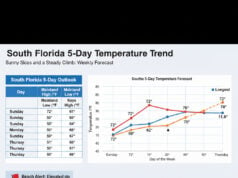
In a raw and gripping new memoir, former money manager and West Palm Beach resident Gregory J. Blotnick chronicles his dramatic fall from Wall Street to Rikers Island. His book, “Blind Spots: A Riches to Rags Story,” explores the devastating consequences of unchecked ambition, addiction, and ethical compromise. It is a rare story in the world of finance—not of riches gained, but of riches lost, and the hard-earned lessons that only failure can teach.
A Meteoric Rise, and a Devastating Fall
Blotnick’s story begins like many Wall Street success stories. Ambitious and driven, he climbed the career ladder quickly as he navigated the world of hedge funds and high-stakes investing. Everything appeared to be the stereotypical Manhattan version of the American Dream.
But behind the scenes, cracks were forming. As the pandemic upended markets in 2020, Blotnick made a series of increasingly reckless decisions that would ultimately destroy everything he had worked to build over the years. Both the speed of the narrator’s decline and his seeming inability to defeat his inner demons make this cautionary tale read at times like a modern-day Greek tragedy.
A Memoir That Doesn’t Flinch
Blind Spots is not a sanitized tale of redemption. The memoir details not just the high-profile rise and fall, but the emotional and psychological toll of a lifestyle built on performance and prestige. He offers a brutally honest account of how ego, addiction, and self-denial led to his collapse. In an industry that prizes invulnerability, Blotnick’s willingness to admit failure—without excuses or deflection—is striking. “I’m not here to make excuses,” he writes. “Actions have consequences. Period.”
This sense of accountability is one of the defining features of Blind Spots. Unlike many memoirs in the finance genre that seek redemption through reputation management, Blotnick’s story is unvarnished. He doesn’t shy away from the details of his missteps or the pain they caused—to himself and others. He owns the consequences and offers his story as a lesson for others tempted by the same illusions of invincibility.
Critical Acclaim
What sets the book apart is its psychological and emotional depth. It’s not just about numbers, markets, or trades. It’s about identity, addiction, and the emotional void that no amount of money can fill. Blotnick details his descent from grace with a narrative voice that is at once self-aware and unsparing.
Critics have taken note, with editorial reviews praising the book’s raw honesty and emotional depth. Kirkus Reviews calls it “a raw, self-aware, and earnest remembrance,” noting its vivid portrayal of privilege, addiction, and consequence. Manhattan Book Review awarded 4.5 stars, describing it as “a searing, unflinching memoir of self-destruction and consequence” that doubles as “a darkly comic reflection.” US Review of Books hailed it as “a well-written, thought-provoking, and incredibly honest account of [his] fall from grace.”
More Than a Memoir — A Cautionary Tale
Beyond the personal narrative, the memoir offers readers a rare window into the psychological pressures of Wall Street. The book explores how high-achievers often suppress vulnerability in favor of appearance, and how that emotional repression can quietly erode judgment. Blotnick draws a line between the high expectations placed on elite professionals and the internal crises they often endure in silence.
He also addresses the role of addiction in his downfall. In clear and direct language, he discusses how substance abuse became a coping mechanism and, eventually, a contributing factor in his “death spiral” of poor decisions. His story challenges the stereotype that addiction is limited to the marginalized, showing instead how it can affect even the most outwardly successful individuals.
Yet, even in its darkest moments, Blind Spots is not hopeless. Blotnick uses his experience to encourage reflection, accountability, and growth. He highlights the importance of self-awareness, humility, and the willingness to seek help. In an especially moving gesture, he is donating all proceeds from the book to the American Foundation for Suicide Prevention, transforming personal failure into a force for good.
A Timely Wake-Up Call
The book also engages with broader themes that resonate in today’s cultural climate. At a time when society is grappling with questions about wealth inequality, corporate ethics, and the impact of mental health on performance, Blind Spots offers a compelling case study. It asks readers to look beyond the headlines and question the systems that reward excess while ignoring warning signs.
Blotnick also lifts the curtain on the criminal justice system, describing in vivid detail his time at Rikers Island. His insights are sobering, showing how even those with every imaginable advantage can find themselves entangled in a system that is both impersonal and unforgiving. Yet he avoids self-pity, instead focusing on the human cost of his decisions and the structural challenges faced by many others behind bars.
In a media landscape dominated by tales of meteoric success, Blind Spots is a powerful reminder that the stories we need most are sometimes the ones about failure. Blotnick’s memoir is a mirror, forcing readers to confront their own assumptions about success, integrity, and the true meaning of redemption.
For those interested in Wall Street culture, addiction recovery, ethics in finance, or personal transformation, Blind Spots offers an unfiltered and essential perspective. It is a sobering account, yes, but also one that invites growth and compassion.
In the end, Blotnick’s story is about more than a fall from grace. It’s about the slow, painful process of rebuilding—not a brand or a reputation, but a life. And in telling that story with honesty and humility, he may just help others avoid the same blind spots that nearly destroyed him.
“Blind Spots: A Riches to Rags Story” is available now on Amazon and other major platforms.
Disclaimer
The information contained in South Florida Reporter is for general information purposes only.
The South Florida Reporter assumes no responsibility for errors or omissions in the contents of the Service.
In no event shall the South Florida Reporter be liable for any special, direct, indirect, consequential, or incidental damages or any damages whatsoever, whether in an action of contract, negligence or other tort, arising out of or in connection with the use of the Service or the contents of the Service.
The Company reserves the right to make additions, deletions, or modifications to the contents of the Service at any time without prior notice.
The Company does not warrant that the Service is free of viruses or other harmful components












